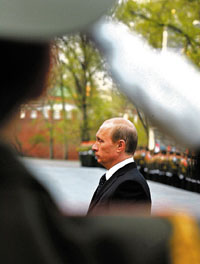Former Soviet leaders turn away from Putin and ignore informal CIS summit
Russia’s President Putin has never found himself in such an uncomfortable situation. The leaders of the former Soviet Union republics were supposed to gather in Moscow today to participate in a two-day summit. The Russian president invited his colleagues from the former USSR to discuss the current state of affairs in the world and the issues linked with reform within the Commonwealth of Independent States. The agenda of the meeting did not include any mandatory issues, no documents were going to be approved during the summit, Itar-Tass reports.

It became known today that the presidents of Georgia, Ukraine and Armenia refused to come to Moscow. The president of Turkmenistan did not attend either, but Putin had been informed of his unwillingness to participate in the summit in advance.
President Mikhail Saakashvili of Georgia wanted to meet with Russian President Vladimir Putin for a private meeting on the sidelines of the gathering to discuss rising tensions over Russia's perceived support for separatists in his nation.
Ukrainian President Viktor Yushchenko, another leader who has sought to lessen Russian influence and turn his country toward the West, also decided not to attend the two-day meeting, the AP reports.
A Georgian Foreign Ministry official who was organizing Saakashvili's visit said he would not go because the busy summit schedule would not allow for a substantive meeting with Putin. The Kremlin never confirmed that Putin would hold separate talks with the Georgian president.
Talks with Putin were "the main reason for the president's trip" to Moscow, Georgian Deputy Foreign Minister Merab Antadze told Georgia's Rustavi-2 television.
He said Russian and Georgian officials had agreed a visit would be planned in the near future.
Georgia's parliament recently passed a resolution calling for the withdrawal of Russian peacekeepers whose presence in two separatist Georgian regions, South Ossetia and Abkhazia, is one of a host of irritants between the two nations. The parliament resolution was widely seen as a bid to strengthen Saakashvili's position in talks with Putin.
Russian authorities, who accuse Georgia of planning provocations as a pretext for a forceful takeover of South Ossetia, warned this week that Moscow would use all means at its disposal to protect its peacekeepers and citizens in the separatist provinces - where most residents have Russian passports.
Created amid the breakup of the Soviet Union in 1991, the 12-nation, Russian-dominated CIS has been criticized by its own members as ineffective and torn in recent years by the rise of Westward-leaning leaders in Georgia and Ukraine and Moldova's reorientation toward the West. Russia, meanwhile, has shored up ties with authoritarian Central Asian nations.
Yushchenko's spokeswoman, Iryna Gerashchenko, said he would not attend because of his country's political situation.
Ukraine has been embroiled in political crisis since Yushchenko's Russian-backed rival for the presidency in 2004, Viktor Yanukovych, came out ahead in March parliamentary elections, and the president has been deliberating about how to respond to parliament's effort to make Yanukovych prime minister.
Armenian President Robert Kocharian, a close ally of Russia , will also not attend the meeting because he has a cold, said his spokesman, Viktor Sogomonian.
Turkmenistan's President Saparmurat Niyazov was to stay away from the summit, as he has repeatedly in the past, and Tajik President Emomali Rakhmonov's plans were uncertain.
The informal summit was expected to include dinner at a waterside restaurant in an upscale Moscow suburb and a visit to the track for a horse race dubbed the Russian President's Cup.
Subscribe to Pravda.Ru Telegram channel, Facebook, RSS!


